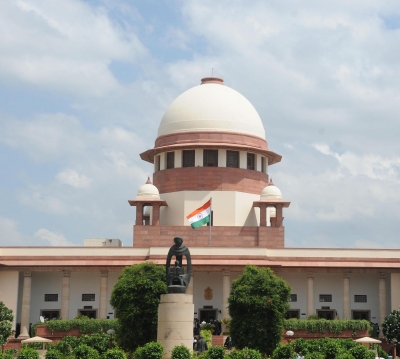New Delhi, May 1 : The Supreme Court on Monday ruled that it can use its extraordinary powers under Article 142 (1) of the Constitution to dissolve a marriage, which is irretrievably broken down by doing away with procedure and a waiting period under the Hindu Marriage Act.
It, however, stressed that grant of divorce on the ground of irretrievable breakdown of marriage by it is not a matter of right, “but a discretion which is to be exercised with great care and caution”, and elaborated on factors which are worthy of consideration to dissolve the marriage.
A five-judge bench comprising Justices S.K.Kaul, Sanjiv Khanna, Abhay S.Oka, Vikram Nath, and J.K.Maheshwari said: “We wish to clearly state that grant of divorce on the ground of irretrievable breakdown of marriage by this court is not a matter of right, but a discretion which is to be exercised with great care and caution, keeping in mind several factors ensuring that ‘complete justice’ is done to both parties”.
It noted that the apex court should be fully convinced and satisfied that the marriage is totally unworkable, emotionally dead and beyond salvation and, therefore, dissolution of marriage is the right solution and the only way forward and the marriage has irretrievably broken down is to be factually determined and firmly established.
“For this, several factors are to be considered such as the period of time the parties had cohabited after marriage; when the parties had last cohabited; the nature of allegations made by the parties against each other and their family members; the orders passed in the legal proceedings from time to time, cumulative impact on the personal relationship; whether, and how many attempts were made to settle the disputes by intervention of the court or through mediation, and when the last attempt was made, etc,” said the bench.
It said the period of separation should be sufficiently long, and anything above six years or more will be a relevant factor, but these facts have to be evaluated keeping in view the economic and social status of the parties, including their educational qualifications, whether the parties have any children, their age, educational qualification, and so on.
“And whether the other spouse and children are dependent, in which event how and in what manner the party seeking divorce intends to take care and provide for the spouse or the children.Question of custody and welfare of minor children, provision for fair and adequate alimony for the wife, and economic rights of the children.We would not like to codify the factors so as to curtail exercise of jurisdiction under Article 142(1) of the Constitution, which is situation specific.
Some of the factors mentioned can be taken as illustrative, and worthy of consideration”, it said.
The bench said public interest demands that the marriage status should, as far as possible, be maintained, but where the marriage has been wrecked beyond the hope of salvage, public interest lies in recognising the real fact.
No spouse can be compelled to resume life with a consort, and as such, nothing is gained by keeping the parties tied forever to a marriage which has, in fact, ceased to exist, it said.
The top court said Article 142(1), which gives wide and capacious power to it to do ‘complete justice’ in any ’cause or matter’ is significant, as the judgment delivered by this court ends the litigation between the parties.”Given the expansive amplitude of power under Article 142(1) of the Constitution, the exercise of power must be legitimate, and clamours for caution, mindful of the danger that arises from adopting an individualistic approach as to the exercise of the constitutional power,” it said.
The five-judge bench answered legal questions raised following the reference made in 2016 by a three-judge bench.
Justice Khanna, who authored the unanimous judgment on behalf of the bench, said the apex court can depart from the procedure as well as the substantive laws, as long as the decision is exercised based on considerations of fundamental general and specific public policy.
He said once serious endeavours for reconciliation have been made, but it is found that the separation is inevitable and the damage is irreparable, divorce should not be withheld.
An unworkable marriage, which has ceased to be effective, is futile and bound to be a source of greater misery for the parties, he said.
The court also held that the top court can exercise power under Article 142(1) of the Constitution, quash and set aside other proceedings and orders, including criminal proceedings filed by the parties against each other.
“In exercise of power under Article 142(1) of the Constitution, this court has the discretion to dissolve the marriage on the ground of its irretrievable breakdown.This discretionary power is to be exercised to do ‘complete justice’ to the parties,” the bench said.
The bench observed that as a court of equity, it is required to also balance the circumstances and the background in which the party opposing the dissolution is placed and the discretion has to be exercised on the basis of the factual matrix in the particular case.
It said once the condition for waiting period, i.e.gap of one and a half year from the date of separation is fulfilled, it can be safely said that the parties had time to ponder, reflect and take a conscious decision on whether they should really put the marriage to end.
“This period of separation prevents impulsive and heedless dissolution of marriage, allows tempers to cool down, anger to dissipate, and gives the spouses time to forgive and forget.At the same time, when there is complete separation over a long period and the parties have moved apart and have mutually agreed to separate, it would be incoherent to perpetuate the litigation by asking the parties to move the trial court.”
The bench said courts must not encourage matrimonial litigation, and prolongation of such litigation is detrimental to both the parties who lose their young age in chasing multiple litigations.”Thus, adopting a hyper-technical view can be counter-productive as pendency itself causes pain, suffering and harassment and, consequently, it is the duty of the court to ensure that matrimonial matters are amicably resolved, thereby bringing the agony, affliction, and torment to an end,” it said.
Concluding the 62-page judgment, Justice Khanna said: “This Court, in exercise of power under Article 142(1) of the Constitution of India, has the discretion to dissolve the marriage on the ground of its irretrievable breakdown.This discretionary power is to be exercised to do ‘complete justice’ to the parties, wherein this court is satisfied that the facts established show that the marriage has completely failed and there is no possibility that the parties will cohabit together, and continuation of the formal legal relationship is unjustified.The court, as a court of equity, is required to also balance the circumstances and the background in which the party opposing the dissolution is placed.”
ss/vd
#care #divorce #irretrievable #breakdown #Delhi # Vikram #Vikram #Delhi #New Delhi







